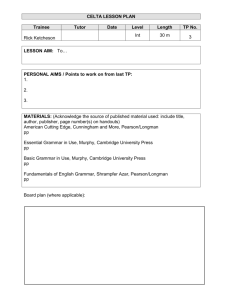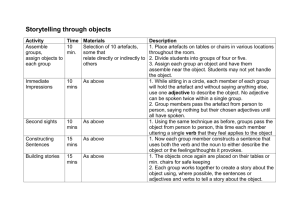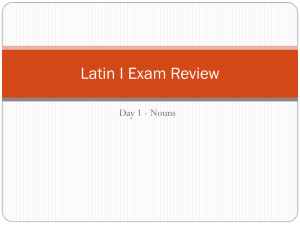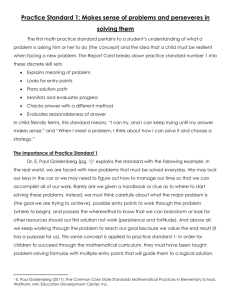Controlled practice in TL
advertisement
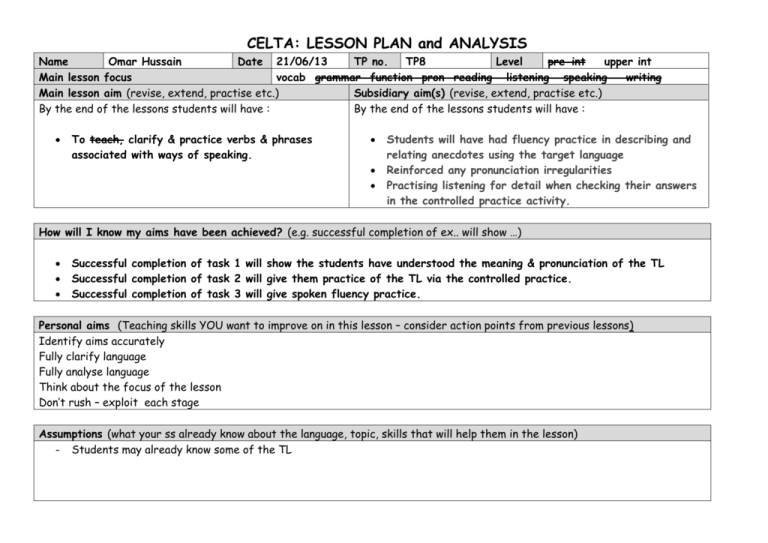
CELTA: LESSON PLAN and ANALYSIS Name Omar Hussain Date 21/06/13 TP no. TP8 Level pre-int upper int Main lesson focus vocab grammar function pron reading listening speaking writing Main lesson aim (revise, extend, practise etc.) Subsidiary aim(s) (revise, extend, practise etc.) By the end of the lessons students will have : By the end of the lessons students will have : To teach, clarify & practice verbs & phrases associated with ways of speaking. Students will have had fluency practice in describing and relating anecdotes using the target language Reinforced any pronunciation irregularities Practising listening for detail when checking their answers in the controlled practice activity. How will I know my aims have been achieved? (e.g. successful completion of ex.. will show …) Successful completion of task 1 will show the students have understood the meaning & pronunciation of the TL Successful completion of task 2 will give them practice of the TL via the controlled practice. Successful completion of task 3 will give spoken fluency practice. Personal aims (Teaching skills YOU want to improve on in this lesson – consider action points from previous lessons) Identify aims accurately Fully clarify language Fully analyse language Think about the focus of the lesson Don’t rush – exploit each stage Assumptions (what your ss already know about the language, topic, skills that will help them in the lesson) - Students may already know some of the TL NB Make sure you give a stapled copy of the plan and all materials (e.g. correctly sourced handouts /copies of powerpoint slides) to the tutor BEFORE the lesson starts. To save trees, print 6 slides to an A4 handout. Anticipated classroom management problems and solutions ( NOT language) Problem Solution Ss speak over me while I'm talking Get their attention somehow, whether it’s by tapping the desk, tapping the WB, wave hand, throw something at them. Ss speak among themselves in their own language Separate them in next task Ss don’t use TL during discussions Encourage them to do so by asking them questions which will force them to use them. Materials (state the materials you’re going to use. NB you must reference all handouts and attach a copy with your plan) Total English - Students Book, p. 139 Total English – Audio, 10.6 Language Analysis Sheet 2: Lexis Use this analysis sheet for language lessons focusing on lexis or for any lexis being pre-taught as part of a skills lesson How will you present this language to the students? How will they first meet the language? Language from a text of the previous trainee Lexical item To whisper To shriek Preteach? √ Main focus √ √ √ Meaning Form Pronunciation (ways of checking eg. concept checking questions, visuals, realia..) (part of speech, spelling problems ) (phonemic script, stress) To speak or say something very verb quietly using your breath rather than your voice. CCQ’s: -Loud? No. -Can a lot of people hear me? No -Do you want everyone to hear you? No (Demonstrate) tə ˈwɪspə (Stress: To whisper) To make a very high loud sound, verb especially because you are afraid, angry, excited or in pain. CCQ’s: -Loud? How loud? Very? Yes -Does it come out all of a sudden? Yes -When do you make this noise? When afraid, angry, excited, or in pain tə ʃriːk (Stress: to shriek) To blurt out √ To say something suddenly and without thinking, usually because you are nervous or excited. CCQ’: -Did you think before you said it? No -Is it quiet? Not always -Do you mean to say it? No Phrasal verb (multi-verb word) To blurt out sth To blurt| sth |out | It | Can u separate? Where does the pronoun go? The object can move tə blɜːt ˈaʊt (Stress: to blur-tout) To blurt out something. To blurt something out Separable (transitive phrasal verb) To be unable to say anything because you are very surprised/upset. CCQ’s: -Can you think of anything to say? No -Do you want to say something? Yes -Are you trying to think of something to say? Yes Fixed phrase (idiomatic) tə bi lɒst fə ˈwɜːdz (Stress: to be lost for words) √ To be lost for words √ To mumble To say something too quietly or verb not clearly enough, so that other people cannot understand you. CCQ’s: -Are you saying something loud? No -Can people understand you? No -Does it have a negative connotation? Yes -Is it intentional? No(??) (Demonstrate) tə ˈmʌmbl̩ (Stress: to mumble) To stop someone from continuing what they are saying or doing by suddenly speaking to them, making a noise. (Demonstrate) CCQ’S: -Is someone else talking when I interfere? Yes -Did I stop them? Yes -Is it usually polite? No verb tu ˌɪntəˈrʌpt (Stress: to interrupt) Fixed phrase (idiomatic) tə spiːk jə maɪnd (Stress: to speak your _mind_) √ To interrupt √ To speak your mind To tell people exactly what you think, even if it offends them. CCQ’s: -Do you tell the truth? Yes -Does it hurt the person listening? Sometimes √ To have a word with (someone) To talk to someone quickly privately, especially because you want to tell them to do something or you want their advice about something. CCQ’s -Is it a private discussion? Most of the times, yes -Is it important? Yes -Is it an informal phrase? Yes Fixed phrase (idiomatic) tə həv ə ˈwɜːd wɪð (Stress: to have a word with) LA Sheet for extension exercise: To stutter to speak with difficulty because Verb you cannot stop yourself from repeating the first consonant of some words. CCQ’s: -Do you understand all he says? No -Is it hard for the person to speak? Yes tə ˈstʌtə To giggle: to laugh quickly, quietly, and in a Verb high voice. CCQ’s: -Is it quietly? Yes -Is it in a high or low voice? High voice Anticipated problems Meaning: may not know difference between mumble with whisper Form: May not know the form of the 3 fixed phrases (idiomatic) Pron: may mispronounce shriek in numerous different ways, for example hey may pronounce it as / ʃreɪk / or / ʃraɪk /. I don’t think they will have a problem pronouncing the other words tə ɡɪɡl̩ Possible solutions Meaning: Ask CCQ’s, mimic lexical item, give example sentence to further clarify its meaning, demonstrate. Form: demonstrate with an example sentence Pron: model/drill STAGE NAME & TIME STAGE AIM TEACHER ACTIVITY STUDENT ACTIVITY MAIN INTERACTION TEACHING AIDS Lead In 2-3 mins To introduce topic of vocab (ways of speaking) - Introduce topic Give an anecdote using some different ways of speaking (Shouting, giggling, stuttering, stammering, speaking quietly or loudly), - Ss listen and answer questions posed at them. T Discovery exercise (Task 1) 5 mins To let ss work out meanings of the vocab - Set task. Group ss into A and B Hand out worksheets & dictionaries - Ss work I pairs out meaning of different words/phrases Ss compare answers as group before next task s-s Worksheet & dictionary Information exchange (Task 1) 5 mins Students share info on meaning, form & pronunciation of TL - Set task Pair ss up (A to B) Let them know I'm going to ask them about each other’s answers during feedback - Student A gives student B meaning and demonstrates sound and which student B guessing which verb, and same vice versa s-s Worksheet Feedback and To ensure all ss clarification have correct 5 mins answers & have understood the vocab of their pair. - Ask each ss to give me the meaning and example phrase of one of the different ways of speaking. - Each ss gives answer when nominated, though has choice of what word/phrase to say S - - - Gap fill exercise (Task 2) 5 mins Controlled practice in TL Feedback and To listen for the further TL & confirm clarification answers (Task 2) 5 mins - Set task Hand out worksheet Get ss working on own - - Play audio and get ss to hear for answers and correct any mistakes Open class FB, getting ss to elicit answers when nominated Ask CCQ’s after getting each answer to make certain ss know the meaning. Give short example story using meaning and ask them for words Set task and get each student to give a situation of three situations. Remind them to look back at task 3 for ideas. Tell them they would need to tell me their partners scenario Ask ss to give the whole class their feedback - - Discussion (Task 3) 10 – 15 mins Freer practice of TL - - Feedback (and Further practice clarification of TL where needed) (5-10 mins) - - - Ss work through task on own Pair check at end Early finisher writes on WB S Worksheet Ss check answers while listening to audio Elicit answers when nominated s-t Audio (10.6) Ss talk among themselves (hopefully those Spanish students don’t talk in their foreign language!) s-s - Ss give whole class feedback of their partners story s-t - - - - - “If time” activity 5-10 mins Ext of vocab to do with ways of speaking. - Set task Hand out task - Ss in pairs s Worksheet
